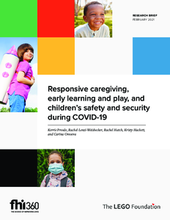During the COVID-19 pandemic there have been drastic changes in family life and to programs and services that promote and protect early childhood development, including childcare, education, and child protection services. This rapid review takes stock of emerging research on nurturing care for young children during the COVID-19 crisis. This review synthesizes 112 scholarly and scientific studies that have examined three pillars of nurturing care during the pandemic: responsive caregiving, early learning and play, and children’s safety and security. The findings can inform global early childhood development and other stakeholders, who have advocated for increased support and funding to ensure young children and caregivers are supported and protected during the COVID-19 pandemic. In an effort to balance research breadth with rigor, we included only evidence that was supported by a full description of the methodology, resulting in 95 quantitative studies, 9 qualitative studies, and 8 mixed methods designs.1 While most studies (89) in the review focus on high income countries, there is increasing geographic diversity, including studies in Bangladesh, Brazil, Cambodia, China, Ethiopia, India, Iran, Mexico, Nigeria and Turkey. We found the largest numbers of papers addressing issues related responsive caregiving and parental stress and mental health during the COVID-19 pandemic, followed by studies examining issues related to children’s safety and security, such as a reduction in referrals for potential child maltreatment. We found relatively few studies related to opportunities for early learning and play during the pandemic, indicating a need for the generation of more research on these topics.
Read also: Case Studies of Programmes to Promote and Protect Nurturing Care during the COVID-19 Pandemic

